“Año de la neurociencia, recortes en I+D+i” (Eng)
![]() IBEC group leader José Antonio del Río contributed to an Expansión article from August about funding for research, in particular neuroscience, for which 2012 was a “Year of” in Spain.
IBEC group leader José Antonio del Río contributed to an Expansión article from August about funding for research, in particular neuroscience, for which 2012 was a “Year of” in Spain.
![]() IBEC group leader José Antonio del Río contributed to an Expansión article from August about funding for research, in particular neuroscience, for which 2012 was a “Year of” in Spain.
IBEC group leader José Antonio del Río contributed to an Expansión article from August about funding for research, in particular neuroscience, for which 2012 was a “Year of” in Spain.
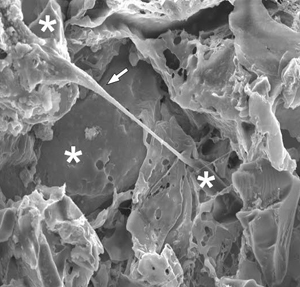 IBEC researchers have stuck tissue engineering gold with the creation of a new ‘smart’ biomaterial that triggers angiogenesis by providing the biochemical and mechanical cues needed for the process to begin.
IBEC researchers have stuck tissue engineering gold with the creation of a new ‘smart’ biomaterial that triggers angiogenesis by providing the biochemical and mechanical cues needed for the process to begin.Researchers in Josep Planell’s Biomaterials for Regenerative Therapies group, in a paper led by Elisabeth Engel, reveal their calcium phosphate glass/PLA composite that itself promotes the mobilization and differentiation of endothelial progenitor cells – those that become the cells making up the lining of blood vessels.
“In regenerative medicine, successful tissue repair hinges on being able to recreate the right environment, so that the biomaterial not only acts as a scaffold for the new tissue but also contributes to the activation of the regeneration process,” explains Elizabeth.
 Senior research associate Jérôme Noailly of the Biomechanics and Mechanobiology group features in an article about mobility and the opportunities offered to international researchers in the latest edition of Informacions, a monthly magazine on research, teaching and institutional activities at the UPC.
Senior research associate Jérôme Noailly of the Biomechanics and Mechanobiology group features in an article about mobility and the opportunities offered to international researchers in the latest edition of Informacions, a monthly magazine on research, teaching and institutional activities at the UPC.
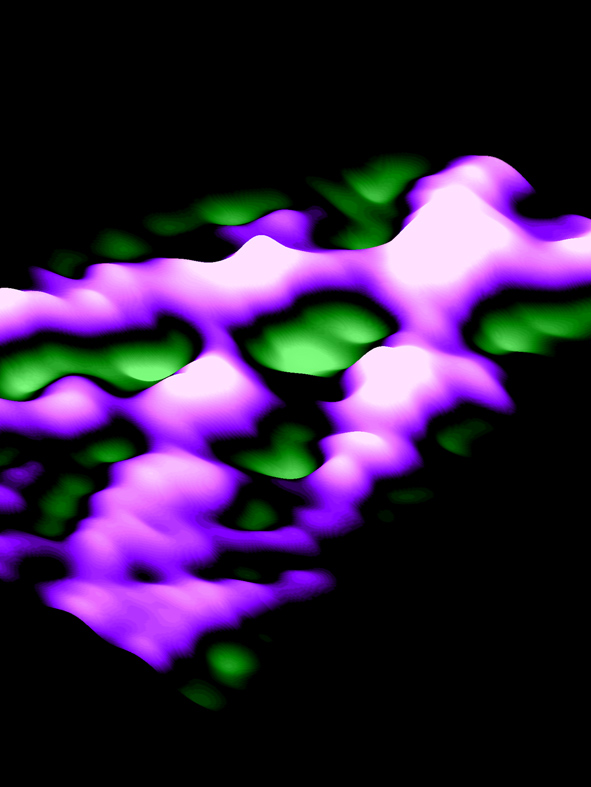 The Integrative Cell and Tissue Dynamics group published their latest results in the quest to understand how the cells in our bodies collectively migrate in Nature Physics this week.
The Integrative Cell and Tissue Dynamics group published their latest results in the quest to understand how the cells in our bodies collectively migrate in Nature Physics this week.In studying the motion of cell clusters, the researchers detected evidence of wave-like crests of deformation launched at the edges of the clusters and propagating from cell to cell at roughly twice the speed at which cells were moving.
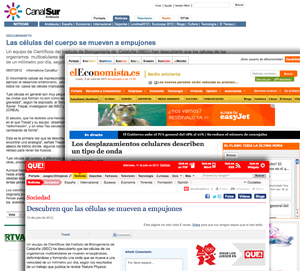 Media coverage of the Integrative Cell and Tissue Dynamics group’s work in Nature Physics this week:
Media coverage of the Integrative Cell and Tissue Dynamics group’s work in Nature Physics this week:
![]() Media coverage of the Nanoscale Bioelectrical Characterisation group’s work in Nature Materials this week:
Media coverage of the Nanoscale Bioelectrical Characterisation group’s work in Nature Materials this week:
http://www.lswn.it/comunicati/stampa/2012/riconoscimento_nano_oggetti_e_virus_senza_marcatori
In their paper “Label-free identification of single dielectric nanoparticles and viruses with ultraweak polarization forces”, Laura Fumagalli, group leader Gabriel Gomila and their colleagues present their work on a new technique to identify nano-objects such as viruses without the need for labeling, which could offer a breakthrough for biomedical diagnostics, environmental protection and nano-electronics.
 Britain and Catalonia may not agree about everything, especially when it comes to football, but one area in which they demonstrate a united front is nanotechnology. The UK is one of the three leading countries in the world for health-related nanotechnology, while in Catalonia, nanobiomedicine has become a particular research strength, with Barcelona the second city in the world with more scientific publications on the subject after Boston.
Britain and Catalonia may not agree about everything, especially when it comes to football, but one area in which they demonstrate a united front is nanotechnology. The UK is one of the three leading countries in the world for health-related nanotechnology, while in Catalonia, nanobiomedicine has become a particular research strength, with Barcelona the second city in the world with more scientific publications on the subject after Boston.
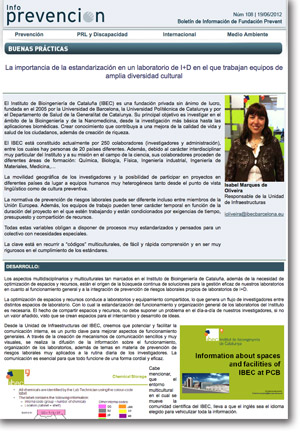 The work of IBEC’s infrastructures team features in this week’s issue of Info Prevencion, the newsletter of the Fundación Prevent, a non-profit organization promoting safer work environments.
The work of IBEC’s infrastructures team features in this week’s issue of Info Prevencion, the newsletter of the Fundación Prevent, a non-profit organization promoting safer work environments.
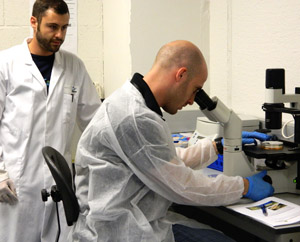 18 young researchers from all over Europe have been learning new skills yesterday and today in the lab sessions part of the second “Interrogations at the Biointerface” Advanced Summer School, hosted by IBEC.
18 young researchers from all over Europe have been learning new skills yesterday and today in the lab sessions part of the second “Interrogations at the Biointerface” Advanced Summer School, hosted by IBEC.